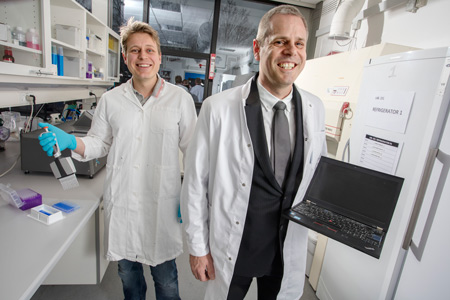The company
Saxocon was born of a good idea and an enterprising investor. And the researchers behind the idea voluntarily declined to be directly involved in the project.
It is usually charitable foundations or public sector institutions that dip into their pockets to help researchers commercialize their ideas. But what if it is an enterprising private citizen who offers his own time and money, and wants to set up his own business, in return for the researchers agreeing not to get involved in the day-to-day operation?
At first glance, this might look rather like letting in someone who is only interested in making money off other people’s work, but it can actually turn out to be an excellent solution. In any case, that is the experience of Eva Bay Wedebye and Nikolai G. Nikolov, two researchers from DTU Food,who had been working on a technology for quickly predicting whether chemical substances are poisonous—an area that is highly relevant in the pharmaceutical industry, for example. The two researchers knew that they were sitting on important knowledge, and DTU was ready to help them turn their research into a business,so they made sure to attend DTU’s Medico Bazaar, where they soon attracted the attention of Martin Friis-Mikkelsen, engineer and entrepreneur. He agreed that they had something worth investing in, a partnership took shape and the consultancy company Saxocon was born.
Instead of following the tried and tested routine of submitting applications to wealthy foundations, the new partners chose a less conventional way of giving their project a boost: Martin Friis-Mikkelsen financed the launch himself; he owns the majority of the company and hires the researchers as consultants. DTU holds shares in the company and has a profit-sharing agreement with the researchers.
Tough start
Martin contributes all the commercial input, cash and—most importantly—time to building up the business. And it has been tough, as is often the case with start-ups.
“It took about 18 months before I could actually pay myself, and I’m still not making much of a salary,” says Martin Friis-Mikkelsen, who immediately goes on to emphasize that having to tackle a tough initial period did not come as a big surprise."That’s just the way it is. I’ve done things a little differently, and there are a lot of benefits to self-financing.”
These benefits include the fact that he holds the reins himself, and is not obliged to follow instructions from external investors.
At the other end of the business chain sit the two originators of the idea, who have kept their jobs at DTU and only turn their attention to Saxocon when Martin Friis-Mikkelsen needs their help in connection with what is known as the QSAR (Quantitative Structure-Activity Relationship) analysis used to predict a the property of a given chemical on the basis of models.
When this happens, DTU issues an invoice for their work—and that is otherwise the limit of the researchers’ involvement with the business.

Desire for commercialization
DTU is joint-owner of Saxocon, and Anders Permin, Senior Executive Officer at the Office for Innovation and Sector Services (OIS) has a seat on the Board.
In his opinion, the set-up is an excellent solution for DTU researchers with good ideas who would prefer to continue working as researchers rather than enter the world of business full-time.
“The Danish Ministry of the Environment has clearly stated its desire to see commercialization of the competence researchers possess. As a university, we’re not geared to carrying out marketing and running this kind of business; that’s why we went looking for a partner. When we met Martin (Friis-Mikkelsen, ed.) at the Medico Bazaar, it soon became evident that it was a match made in heaven,” he explains.
Anders Permin goes on to relate that this form of spinout involving private investors is an approach in which several DTU researchers have expressed an interest. And even though it naturally requires both parties to be fully familiar with one another—along with a high level of trust—it is a set-up he is happy to recommend other researchers with good ideas to consider.